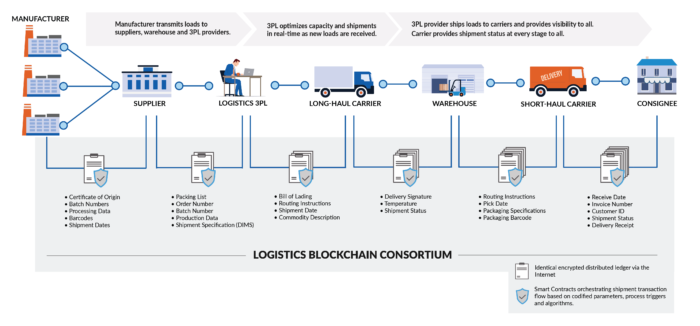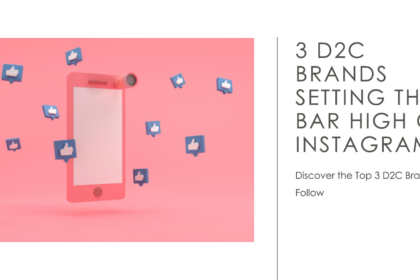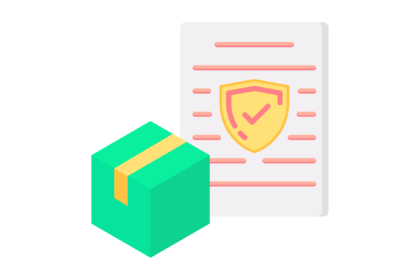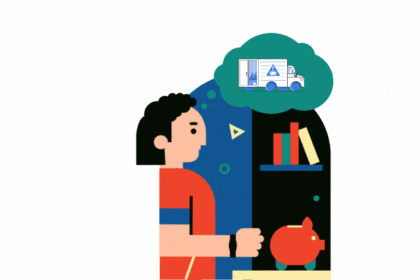The world is a global village now and while it has expanded horizons for businesses, it has also added to supply chain complexities. Supply chain management professionals are constantly on the lookout for technology that will help them collaborate efficiently on a global scale.
Among emerging and newly developed technologies used in SCM, blockchain shows much promise.
The important and useful aspects of blockchain technology are
- decentralized/distributed ledger infrastructure for transparency and traceability
- even playing field for trusted data
- accountability and
- streamlined governance
These reasons make blockchain a perfect match for business applications within procurement and logistics.

Source: cnet.com
Supply chains are based on the physical movement of goods and human interaction, action, and sequences. There is scope for a lot of error and oversight, given the nature of multiple players and human intervention from several legs of the supply chain. Blockchain offers several technological capabilities to accomplish excellent efficiency levels with streamlining and automating processes.
Recently, an Israeli shipping organization managed to incorporate blockchain technology in digitizing the eBL of a ship. An eBL is a manifesto of a ship’s cargo which is given to the master or captain of the vessel as part of the ship’s legal documentation. The measure has shown immense improvement in reducing time, complexity, and operating costs for all the stakeholders involved.
With blockchain, logistics and shipping have scope to improve by leaps and bounds. In July 2018, the Commonwealth Bank of Australia used bloackchain tech to track the shipping of 17,000 kilos of almonds halfway around the globe.
Cost Optimization
Supply chains, with their phenomenal shipping and trade, have a huge impact on the global GDP. Blockchain technology can greatly optimise costs and have a good result on GDPs across the world. Maersk and IBM launched an optimised stakeholder pool by digitizing end-to-end shipment tracking. The move can eliminate several costs associated with trade documentation and administrative processes for global shipments. Data exchange in terms of documentation is made tamper proof via blockchain. Blockchain technology can track and trace millions of shipping containers all at the same time. so, delays and frauds can be identified and resolved immediately.
Transparency
A very simple application of blockchain technology in the supply chain is to denote transfer of goods on the ledger as transactions that would identify the parties involved, price, date, location, quality and state of the product etc. Having a central ledger of all information is a great measure to enhance the processes involved. At any given point of time, stakeholders can see what has happened, where and when. No one person can forge the data or change anything about the process. So, to identify disruptions, inefficiencies, fallacies or problem-origins, one simply has to look at the ledger.
If you run an e-commerce organization, things become immensely easy and efficient with blockchain since there is transparent tracking technology. Right from the moment your customer places an order, the chain of events from the warehouse inventory to logistics, everything is clocked individually. Every action is tracked and time stamped. So, there is no way you can miss something.

Source: globaltranz.com
Enabling IoT functionalities
The Internet of Things (IoT) can be used alongside to achieve optimum efficiency in the supply chain. Product verification is done through QR verification codes. Individual products are tagged into groups, providing easy identification regarding ownership, throughout the supply chain.
A distributed database helps stakeholders get information on inventory from anywhere in the world. One needn’t have channelized access to a specific warehouse as everything is integrated into the blockchain. It is also brilliant in terms of accountability. Data is not locked in one place, in one computer or available to a select set of individual to tamper records. So, it greatly dampens enthusiasm insiders have for data theft as they know they will get caught.
Procurement
Procurement excellence is highly dependent on the compliance of first-tier, second-tier, and even third-tier suppliers. With every added tier, the process becomes more complex.
Technology enables linking people and collaborating on monstrous scales. Procurement rates are also made transparent via the blockchain. Coming to procurement processes and the transparency involved, blockchain enhances tendering processes. Tendering is efficient, without any leakage of information and it helps find the best suppliers, resulting in improved quality and performance.
Smart tendering, an integral part of IoT enabled blockchain technology, has a streamlined process that is in use today in parts of Finland. Pallets in the warehouse are equipped with RFID tags. These pallets cite their reasons and need to traverse from point A to point B on the ledger. Carrier mining applications enable bids to win the stated move. The RFID assigns the job to the bidder with the most suitable conditions. All the processes involved are automated and the transaction is registered on the block chain. Each movement of the shipment is tracked through the supply chain.
Anonymity with Transparency
There is no bias in choosing a trader, agent or producer in the supply chain where the RFID or the automated process chooses the most optimal player for each part. Blockchain technology offers balance of transparency with anonymity. Furthermore, there are large producers who do not want to reveal provenance of their goods for fear of losing a competitive advantage. In this case again, block chain allows flow of information in a trustworthy and anonymous way, thereby creating a trustworthy network without revealing who the involved people are.
Auditing and Governance
Transactions are stored with time stamps and the data is tamper proof. So, blockchain offers scope for easy governance. Procurement teams can eradicate defective players with audit reports. Audits offer a one stop shop to see which player has failed where and how. So, block chain enables fraud control, helps eliminate money laundering, ethical oversights and child labour among other things.
Smart Contracting
Every move leaves a trace in the blockchain controlled supply chain. So, automatic triggers are sent using smart contracts. A proof of delivery from a shipping partner can trigger online invoices and initiate a bank payment. So, processes are optimized in terms of time, effort, money and complexity. And since everything is based on verification methods, the payment processes are reliable and accurate.
Supplier Relationship Management
Not only do you see transparency in blockchain technology, but also accountability. The process ensures that players are accountable for their actions. Compliance is interlinked in the entire process. For example, a data transfer between two countries is expected to comply with the regulations in either country. All of this is managed in the blockchain. So, across the world, procurement professionals, suppliers, shipping and logistics partners can align themselves with their trades, improve their own businesses while indulging in trade over trustworthy channels.
Projections for 2019
A major obstacle in the path of accepting Blockchain technology has been its reputation, as it is associated with cryptocurrency and BitCoin. Both of these entities are seen with suspicion across industries. While blockchain technology is very suitable to be adopted by the logistics sector, the association with these unsavoury elements puts people off. But, if 2019 projections are to be believed, blockchain will be re-christened and disassociate itself from cryptocurrency. According to Deloitte’s 2018 Global Blockchain Survey, companies are interested in moving away from proof-of-concept projects to real-world applications. Industry majors will be interested in seeing not just where blockchain could fit, but to find places where it is the best fit.
If you liked this article, you can also check out








